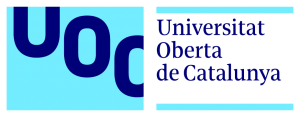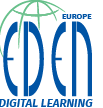
- This event has passed.
2018 Barcelona
October 24, 2018 @ 00:00 – October 26, 2018 @ 00:00


Conference Resources
The EDEN 10th Research Workshop – #EDENRW10 was rich in content and discussions, which also raised attention on social media channels. We collected some of the most popular resources here
- Browse photos of the conference
- Check out the Research Workshop Tweets
- A Statement “Personalized Guidance and Support for Learning- EDEN 10th Research Workshop” has been presented at the closing session of the conference which you can read here.
- Read the Conference Proceedings
Best Research Paper Award
 Since 2008, EDEN has bestowed the Best Research Paper Award at its Annual Conferences and the bi-annual Research Workshops.
Since 2008, EDEN has bestowed the Best Research Paper Award at its Annual Conferences and the bi-annual Research Workshops.
A robust selection process guarantees the high-standing of these awards for contributions to the field of open, distance and e-learning. The selection process takes place in collaboration with the Ulrich Bernath Foundation for Research in Open and Distance Learning, with the support of a distinguished Jury. Read more and see previous winners here.
The Best Research Paper Award ceremony was held at the Conference Dinner and went to Elaine Beirne, Conchúr Mac Lochlainn and Mairéad Nic Giolla Mhichíl from Dublin City University, Ireland for their paper: “Moody MOOCS: An Exploration of Emotion in an LMOOC“.
Council of EDEN Fellows established
At the EDEN Fellows Meeting in Barcelona on October 24, the establishment of the Council of EDEN Fellows was decided, which includes all Fellows and Senior Fellows of EDEN. The Council serves in an advisory role to the EDEN EC, as a think tank for future visioning, and as ambassadors of EDEN. At the meeting, the Fellows present agreed to establish a Board of the Council that comprises: Deborah Arnold, Lisa Marie Blaschke, Don Olcott, Jr., Wim van Petegem, Albert Sangra, Christian Schumann, Torhild Slaatto, and Antonio Teixeira.
Lisa Marie Blaschke was chosen by the Fellows as Chair of the Board.
Congratulations on a productive and successful meeting in Barcelona – and to the newly elected members of the Board of the Council of EDEN Fellows!
Read more about the Fellows Council here.
EDEN’s 2018 Workshop Towards Personalized Guidance and Support for Learning focused on the crucial and changing roles of teachers in supporting student learning in the digital world. This includes the creation of enabling conditions that encourage learning personalization, learner agency and self-direction.
Experiences of learner empowerment resulting from balanced “guide on the side” teaching, timely teaching interventions, consistent feedback and feedforward, explicit teaching of learning-to-learn strategies, assessment for learning, and technology-based adaptive teaching will provide a substantive background for reflection and discussion.
The Scientific Committee encourages potential participants to either submit a paper in the main programme or an abstract proposal in the PhD Symposium.
Themes
Here are the research topics of interest:
- Personalized learning: accompanying learners while addressing distinct learning needs, situations or preferences
- Teachers’ and learners’ roles: rethinking teaching facilitation strategies using the potential of digital technologies
- Open education: making the most of openness to ensure student success
- Adaptive teaching: enhancing teacher decisions through course analytics and course awareness methodologies
- Formative assessment: assessment for learning and the implementation of complementary ipsative approaches
- Feedback: reinforcing teacher-learner dialogue through different channels in networked environments
Keynote speakers
Neil Selwyn

Neil Selwyn is a professor in the Faculty of Education, Monash University. His research and teaching focuses on the place of digital media in everyday life, and the sociology of technology (non)use in educational settings.
Neil has written extensively on a number of issues, including digital exclusion, education technology policymaking and the student experience of technology-based learning. He has carried out funded research on digital technology, society and education for the Australian Research Council (ARC), Economic and Social Research Council (ESRC), British Academy, the BBC, Nuffield Foundation, the Spencer Foundation, Gates Foundation, Microsoft Partners in Learning, Becta, Australian Government Office of Learning and Teaching (OLT), Australian Communications Consumer Action Network (ACCAN), Save The Children, Centre for Distance Education, the Welsh Office, National Assembly of Wales and various local authorities in the UK.
Neil was editor of the journal ‘Learning, Media and Technology’ (2010-2016), and a regular keynote speaker at international conferences. Neil is a core member of the ‘Learning with New Media’ research group within Monash.
Research interests
- Digital technology and society
- The use of digital technologies in educational settings
- The role(s) that digital technologies play in people’s everyday lives
- Digital technology and social exclusion
- Public policy making in the ‘information age’
Related Links:
- Google Scholar profile
- Twitter profile
- Papers available through SocArXiv
- Papers availble through Academia.Edu
Sanna Järvelä
 Sanna Järvelä, PhD, is a professor in the field of learning and educational technology and a head of the Learning and Educational Technology Research Unit (LET) in the Department of Educational Sciences, University of Oulu. Her main research interest deal with learning processes in technology-enhanced learning, self-regulated learning and computer supported collaborative learning. Järvelä and her research group is internationally well known from theoretical advancement of motivation as a contextual phenomena and of social aspects of self-regulated learning. Her research work has also strong contribution to the methodological development of process oriented and qualitative research methods in the field of learning, collaboration and motivation. She has been responsible leader of several international research projects funded by the Finnish Science Academy and her research group (LET) has been partner in the Networks of Excellence (NoE) KALEIDOSCOPE in the area of Technology Enhanced Learning. Järvelä has been an invited expert in different national (e.g. Ministry of Education) and international expert commissions (e.g. OECD and scientific organizations) as well keynote speaker in international conferences (e.g. EARLI and CSCL).During the year 2000-2001 she was visiting scholar in Kings’ College London, UK. She has been an associate editor of Learning and Instruction (2010-2014). Currently is an Editor of Frontline Learning Research and Associate Editor in International Journal of Computer Supported Collaborative Learning (ijCSCL) and editorial board member in several scientific journals (e.g. Educational Psychologist, Educational Research Review). Järvelä has acted as an external examiner of dissertations in Finland and abroad (e.g. The Netherlands, Australia and Hong Kong). She has been a member of Executive Committee of EARLI (2010-2014) and she is the Earli president elect (2015-2016). Currently Järvelä is a member of Oulu University Governing Board. In 2015 Järvelä was invited to the member of the Finnish Academy of Science and Letters. She is the Franqui Chair holder at the Gent University Belgium for the year 2016. Järvelä has published more than 100 scientific papers in international refereed journals and about 50 book chapters and three edited books. In the Oulu University 2014 Research Assessment Evaluation (RAE) her research group LET was ranked 5/6 in the highest vici category.
Sanna Järvelä, PhD, is a professor in the field of learning and educational technology and a head of the Learning and Educational Technology Research Unit (LET) in the Department of Educational Sciences, University of Oulu. Her main research interest deal with learning processes in technology-enhanced learning, self-regulated learning and computer supported collaborative learning. Järvelä and her research group is internationally well known from theoretical advancement of motivation as a contextual phenomena and of social aspects of self-regulated learning. Her research work has also strong contribution to the methodological development of process oriented and qualitative research methods in the field of learning, collaboration and motivation. She has been responsible leader of several international research projects funded by the Finnish Science Academy and her research group (LET) has been partner in the Networks of Excellence (NoE) KALEIDOSCOPE in the area of Technology Enhanced Learning. Järvelä has been an invited expert in different national (e.g. Ministry of Education) and international expert commissions (e.g. OECD and scientific organizations) as well keynote speaker in international conferences (e.g. EARLI and CSCL).During the year 2000-2001 she was visiting scholar in Kings’ College London, UK. She has been an associate editor of Learning and Instruction (2010-2014). Currently is an Editor of Frontline Learning Research and Associate Editor in International Journal of Computer Supported Collaborative Learning (ijCSCL) and editorial board member in several scientific journals (e.g. Educational Psychologist, Educational Research Review). Järvelä has acted as an external examiner of dissertations in Finland and abroad (e.g. The Netherlands, Australia and Hong Kong). She has been a member of Executive Committee of EARLI (2010-2014) and she is the Earli president elect (2015-2016). Currently Järvelä is a member of Oulu University Governing Board. In 2015 Järvelä was invited to the member of the Finnish Academy of Science and Letters. She is the Franqui Chair holder at the Gent University Belgium for the year 2016. Järvelä has published more than 100 scientific papers in international refereed journals and about 50 book chapters and three edited books. In the Oulu University 2014 Research Assessment Evaluation (RAE) her research group LET was ranked 5/6 in the highest vici category.
Research Interests
- Motivation and self-regulation in learning
- Collaborative learning
- Computer supported collaborative learning
- Technology-enhanced learning
- On-line learning processes and multimodal data in SRL
Related Links
PhD Student Symposium
A PhD Student Symposium will take place on 24 October 2018 as part of the EDEN Research Workshop 2018 conference hosted by the Universitat Oberta de Catalunya (UOC) in Barcelona, Catalonia, Spain, 24–26 October 2018. The PhD Student Symposium has been designed to foster the exchange of experiences and knowledge among doctoral students doing research in the area of the event’s theme, “Personalized Guidance and Support for Learning”, while providing a discussion forum for the advancement of doctoral research. The topics related to the EDEN Research Workshop theme are:
- Personalized learning: accompanying learners while addressing distinct learning needs, situations or preferences.
- Teachers’ and learners’ roles: rethinking teaching facilitation strategies using the potential of digital technologies.
- Open education: making the most of openness to ensure student success.
- Adaptive teaching: enhancing teacher decisions through course analytics and course awareness methodologies.
- Formative assessment: assessment for learning and the implementation of complementary ipsative approaches.
- Feedback: reinforcing teacher-learner dialogue through different channels in networked environments.
The PhD Student Symposium will be led by a panel of international experts on e-learning and members of the EDEN Executive Committee.

The aims of the PhD Student Symposium are to:
- Create a community for intellectual exchange and support among e-learning doctoral students researching in the area of e-learning and support for learning.
- Give and receive practical feedback on research topics or specific problems or concerns about their research with their peers.
- Receive feedback on their research topics, problems and concerns from international experts in e-learning research who are experienced supervisors.
Call for presentations
Current doctoral students in the field of e-learning or educational technology are encouraged to submit short abstracts to present an overview of their research at the PhD Student Symposium. Each proposal must be related to one of the research topics listed above. PhD students must currently be studying, ie have had their research proposals approved but have not yet defended their theses. Preference will be given to students who have collected data to analyse. The abstract should be in English, and contain a 300-350 word description of the state of their research and a problem they would like to address in the symposium. It should include the research title, research objectives/questions and methodology. Submit your abstract before 9 July 2018 using this form. The panel of international experts will review the abstracts and select students to participate. Students will be notified by 25 July 2018. Students will then need to prepare a short presentation (between 5-10 slides) before the symposium.

Structure of the PhD Student Symposium
The students selected will have to give a brief presentation (between 5-10 slides) face-to-face or via video-conference, which can include one or two questions for the expert panel and/or other students. This presentation must be designed to last a maximum of 10 minutes. At the end of each presentation, there will be a group discussion, approximately 15-20 minutes per presentation, to answer the questions asked by each participant or offer research advice. The seminar will be streamed live for online participants.
Intended participants
The PhD Student Symposium is an open-invitation event for all PhD students and their supervisors working in the field of e-learning or educational technology. It is aimed at current doctoral students enrolled in any university, both full-time and part-time. We encourage you to take this opportunity to network with fellow researchers, discuss your research, and receive feedback from international experts and your peers.
Submission of applications
All applications must be sent via this form by the 9 July deadline. The list of successful applicants and the final programme will be made public after August 2018.
Date and place of the symposium
The PhD Student Symposium will take place on 24 October 2018 at the Universitat Oberta de Catalunya in Barcelona, Catalonia, Spain. The seminar will be streamed live for online participants.
Important dates
- Open call for presentations: 12 September2018
- Notification of acceptance: 25 September 2018
- Confirmation by presenters: 30 July 2018
- Publication of PhD Student Symposium programme: September 2018
- Submission of participant presentations: 13 September 2018
- PhD Student Symposium: 24 October 2018
Contact details
If you have any queries, or for further information, please visit the EDEN Research Workshop website or email barcelona@eden-online.org.
Partner & Venue

Our Partner, the Universitat Oberta de Catalunya (UOC), is an innovative online university rooted in Catalonia and open to the world, sensitive to the diversity of the global environment and committed to empowering development and social change through education. The mission of the Faculty of Psychology and Education at UOC is to provide university-level, initial and lifelong e-learning, and to promote the creation and dissemination of knowledge in the fields of Psychology and Education. It is a referent on e-learning with more than 13.000 students on bachelor and master degrees. It also has the International master on Education and ICT (e-learning) with a large trajectory (14 years). The Faculty also has a UNESCO Chair in Education and Technology for Social Change.
Conference Venue
 |
 |
The conference venue is the Cosmocaixa Museum, which offers its visitors a greater insight into the world of science. The museum building is just as fascinating as its contents. Cosmocaixa is a beautiful example of modernista architecture, designed and built between 1904 and 1909 by Josep Domènech i Estapà. The modern extension carried out in 2004 highlighted the value of the century-old building while placing it in a new context. The building is just a few steps walk from the UOC main building, where the Welcome Party will be held.
Conference Dinner Venue
 |
 |
 |
Come and explore an evening inside Barcelona’s largest Gothic palace: Palau Requesens, where the Conference Dinner will be held. Enjoy authentic medieval Catalan cuisine and entertainment that will take you back to the middle ages. The palace was built in the 13th century above the city wall of Barcelona, and is named after the Requesens family, who once owned it.
Barcelona

Barcelona, “the city of Marvels” and the passionate capital of Catalonia in Spain, situated between the sea and the mountains, offers a unique balance between the traditional and the avant-garde. Its history is one of the oldests in Europe, its present is full of life: the city has character and charm and one of the liveliest and most beautiful beaches in La Costa Brava. Barcelona harbours an abundant variety of artistic treasures, including Romanesque churches and the works of some of the greatest painters and architects: Dali, Gaudi, Miro and Picasso.
Details
Cosmocaixa
Address: Isaac Newton, 26.
Town: 08022 Barcelona.
How to get there: Bus 60, 73, 123 and 196.| Trains FGC: stop Av. Tibidabo + Tramvia Blau or bus 196.
